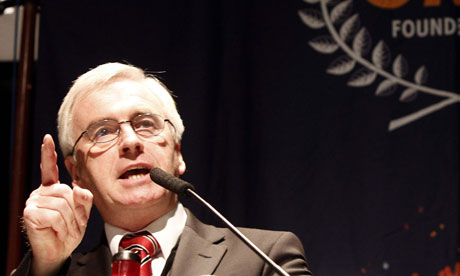Jerry JonesIt seems a nice idea. Tax the financial speculators enriching themselves at our expense and use the proceeds to raise people out of poverty.

The Robin Hood tax campaign, which is sponsored by some 50 charities and other non-government organisations and supported by such luminaries as Comic Relief founder Richard Curtis and Archbishop of Canterbury Rowan Williams, is pushing this course of action.
According to the campaign, a package of financial transaction taxes on the purchase and sale of foreign exchange, shares, bonds and various derivatives, could raise over $400 billion (£250bn) worldwide.
That is more than enough to achieve the Millenium Development Goals, which range from halving extreme poverty to halting the spread of HIV/Aids and providing universal primary education by 2015, or even more ambitious goals.
But aren't these campaigners being a little starry-eyed? Assuming this amount could be raised by such means, can we trust governments to spend it for that purpose?
Already, the German and French governments want to hijack such taxes to fund the EU, whose accounts are notoriously opaque and corrupt.
Moreover, if Western governments were serious about ending poverty and so on, surely they would have long since put up the funds for that purpose?
If a Robin Hood tax could raise such funds, it would be up to the rest of us to campaign for it to be used in that way.
At the moment, the likelihood of a Robin Hood tax being introduced in Britain is nil, given the vehement opposition of the City, the Con-Dem government and right-wing lobby groups.
But just because the City and rightwingers are opposed to it, does that mean we should be for it?
Say a change of government did introduce such a tax and that we could prevent the EU grabbing it. Would the tax be capable of raising the kind of money suggested?
The trouble is that the calculations assume that the buying and selling of those various financial assets would carry on more or less as before.
Consider a transaction tax just on foreign exchange dealings, which is what the Robin Hood tax originally referred to when it was first coined by the campaigning group War on Want in the late 1990s - up to then it was known as the Tobin tax, after the Sveriges Riksbank (aka "Nobel") prize-winning economist James Tobin.
Tobin's original intention when he proposed the tax in 1972 had been not so much to raise funds but to make speculation less attractive. This would make exchange rates less volatile following the 1969 collapse of the Bretton Woods agreement, which had done that job the previous 25 years. But the Tobin tax was never implemented.
Today currency trading amounts to some £400 trillion a year. This is 50 times the total value of goods and services traded globally each year. The difference, it is assumed, is due to the large sums used for speculation.
Campaigners latch onto these figures, suggesting that a transaction tax of just 0.05 per cent could yield some £200bn just on foreign exchange dealings.
However, if the tax was doing its job according to Tobin, the amount of foreign exchange traded would slump to around that required for the purposes of real trade.
That is because it would no longer be worthwhile to speculate, which depends on very thin margins, and trading very large sums. It is likely therefore that nothing like that amount could be raised.
In 1984 Sweden introduced a 0.5 per cent transaction tax on the buying and selling of shares - that is, 1 per cent on a round trip.
Two years later it was doubled, and in addition, a 0.002 per cent transaction tax on bonds and other financial assets was introduced.
However trading volumes fell dramatically - to zero in some cases - and the revenues turned out to be barely 5 per cent of what had been anticipated. The policy was abandoned in 1990.
Britain has had a transaction tax on the purchase of shares - now known as the stamp duty reserve tax - for over two centuries.
The rate of tax has varied between 2 per cent and 0.5 per cent, the current rate.
Studies have found that trading volumes fell considerably when the rate was higher, and vice-versa. These days all financial intermediaries, which account for over 70 per cent of share dealings, are exempt, so its effect on trading volumes is minimal.
This is the dilemma for all transaction taxes. Are they to modify behaviour or to raise revenue?
If the former, they will not raise much revenue. If the latter, if the rate of tax is higher, trading volumes will reduce, so there is less to tax, and if low enough not to affect behaviour, they are likely to be hardly worth collecting.
Moreover, the financial sector is very adept at coming up with devices to get round regulations and avoid tax, making use of offshore tax havens to protect its privileges.
In effect, transaction taxes are an attempt to do things by proxy. Why not campaign for governments to address these issues directly and openly?
First there are more effective ways of raising revenue and to address poverty, and stimulate investment in real productive activities upon which that depends.
For a start, governments could make dealings with offshore tax havens illegal, so that the giant transnational corporations and the rich pay their fair share of taxes.
For Britain, this would of course affect the City, the world's second-biggest tax haven after Switzerland, as well as various enclaves still under British jurisdiction such as the Cayman Islands.
But this would be offset by the extra revenue made possible by eliminating tax evasion, especially if tax rates on profits and high incomes were raised to what they were in previous times.
Furthermore the diminished role of the City would make investment in other parts of the economy more attractive, which is sorely needed.
Meanwhile, genuine traders want stable exchange rates. At present they have to set up complex and expensive hedging arrangements to offset volatility, which in fact is what a large share of the supposed speculation in currencies is about.
This is what the Tobin tax was meant to address, though more recent research suggests that its effect could be to make currencies even more volatile.
It would be far better for all international trade to be conducted in a single global currency not connected with any particular country, with all national currencies adjusted to it, say, every quarter, on the basis of purchasing power parity.
Countries with failing economic polices might suffer, but this would not affect other countries.
Had the euro been introduced on that basis the eurozone now would not be in such difficulties.
For such a policy to work, capital controls would also be needed, but these are needed anyway, not only to cut out speculation but also to stop the surplus labour or profit generated by a country's people ending up somewhere else and therefore not available for investing in that country's economic development - which is what is needed to eliminate poverty.
In short, the campaign for a Robin Hood tax in the form of financial transaction taxes is largely a diversion from the real issues that need to be addressed
 LEAP chair John McDonnell MP spoke in Parliament yesterday (20/03/14) paying tribute to Tony Benn (click to watch via Youtube).
LEAP chair John McDonnell MP spoke in Parliament yesterday (20/03/14) paying tribute to Tony Benn (click to watch via Youtube). "It is interesting that he said we should invest in housing, health and education; give all young people the opportunity to stay on at school with an education maintenance allowance; and make sure that they had a guarantee of an apprenticeship or training and the opportunity to go to university, not by paying a fee but on a grant. That was his programme in 1982. It was prophetic and years in advance of its time. He said that what we needed to create the wealth was an industrial strategy—a manufacturing base based on new technology and skills. Actually, I remember him talking in one of his speeches about alternative energy sources, well in advance of the debate about climate change.
"It is interesting that he said we should invest in housing, health and education; give all young people the opportunity to stay on at school with an education maintenance allowance; and make sure that they had a guarantee of an apprenticeship or training and the opportunity to go to university, not by paying a fee but on a grant. That was his programme in 1982. It was prophetic and years in advance of its time. He said that what we needed to create the wealth was an industrial strategy—a manufacturing base based on new technology and skills. Actually, I remember him talking in one of his speeches about alternative energy sources, well in advance of the debate about climate change.



